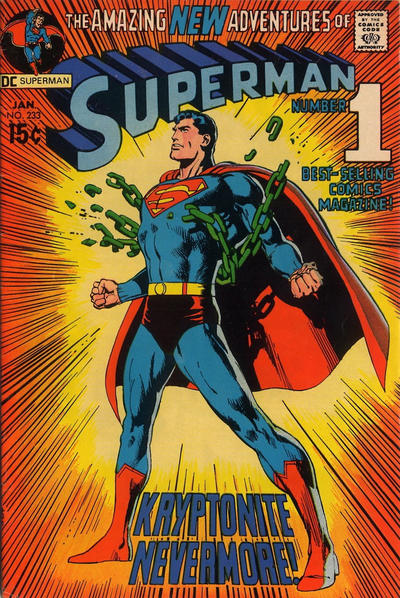The Bronze Age of DC Comics 1970-1984 by Paul Levitz from Taschen finally documents my primetime DC era. While I technically joined the ranks of comics fandom in the waning days of the Silver Age, it was in the Bronze Age that I flourished and found so many of the characters that I adore to this very day. And no small few of those were DC.
As in the previous two tomes this one begins with an interview, this one with Denny O'Neil. He talks about his origin story in comics as "Sergius O'Shaugnessy" for Charlton and how he migrated to DC as part of the merry band that Dick Giordano brought over from the "Action Heroes". He seems to have a keen understanding of how he impacted the form and unlike some others a notion of his strengths and weaknesses. I was surprised to learn that he and Neal Adams were developing a friction in the latter days of their partnership, but that they parted before hostilities broke out.
DC in the 1970's was a company on the run. At first Marvel was hot on their heels with the new Marvel style capturing the fancy of the older readers while DC's stable staff of veterans were more and more out of step with the times. New blood, eager and doubtless less expensive came to the offices of DC and brought with them new ideas and concepts. Some of those ideas, such as exploring race in the pages of Teen Titans proved too much still for the company and others such as becoming somewhat less sanguine with the Vietnam War found some purchase. But the wave was inevitable as modern comics were forced to strip off their Silver Age garb and dress in the modern clothes drenched in politics and social change. The Justice League was called upon to confront pollution while Green Lantern and Green Arrow confronted racism in sundry forms. The old DC was a land of shiny white hats and rugged black hats, but now those distinctions were muddied with characters such as Jonah Hex, Manhunter, and even Batman himself who returned to his grim dark beginnings, fighting crime with fear as much as gimmicks. The big blast that began it all was the arrival of Jack "King" Kirby who landed on the DC shores chock full of big ideas and eager to unleash his pent-up visions on the comic reading world in formats heretofore unexplored. He met with resistance and sales early seemed weak but eventually proved strong enough to have continued. Truth was he was a maverick creator in a company not yet used to such antics and while he was also a reliable talent who more than met his obligations, he was nonetheless eventually allowed to wander off. His ideas stayed and have injected new much needed adrenaline into the line even all these decades later. Despite clever efforts to package comics such as the 25 cent books and 100-Page Spectaculars, DC lost its position as number one, but that seemed only to make them try harder and I for one enjoyed the effort.
Here are some of the covers featured in this volume. You might notice a lot of the work of Neal Adams in this gallery and that's not me picking them, but reflects how Adams dominated this volume.
The Bronze Age closed when a Crisis on Infinite Earths in an act of grand bravado swept away much of the lore that had informed the DCU for decades. All good things come to an end they say.
Rip Off




































DC developed a really beautiful sense of packaging during this period with a lot of design work by Infantino and cover artists like Adams and eventually Wrightson. Their publishing policy seemed a bit spastic and insecure, and they rarely succeeded when trying to be cool. (Of course, if you're trying then you're not cool.) I think Denny O'Neil's injection of current issues into his comics grew out of his experience in journalism and was pretty sincere. But once "relevance" became hip, you had a lot of young writers with little life experience producing a lot of fake stories. I thought the attempts at portraying race in some of this stuff was presumptuous and ignorant, particularly at DC and Marvel.
ReplyDeleteWhile I agree that many of those "relevant" stories were stereotypical the very fact they existed I think was important for this young man and his developing worldview. It instilled a sense of liberalism in me which was uncommon in my local politics for sure.
Delete